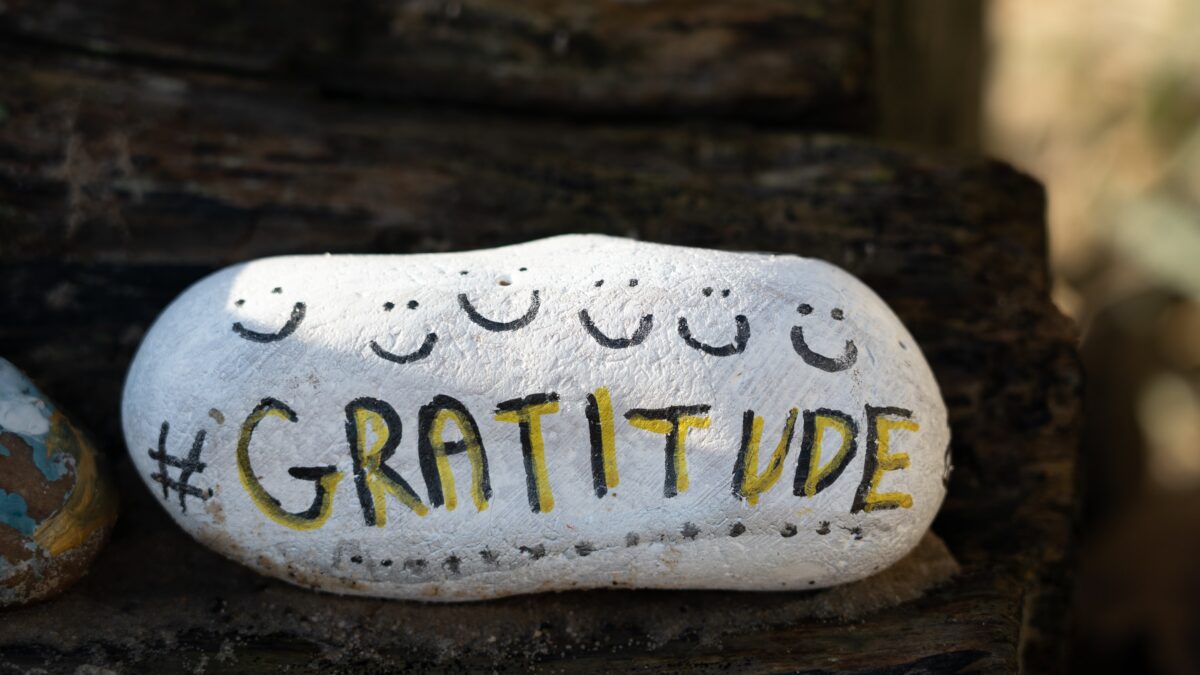What is Gratitude and Why Does It Matter?
What is Gratitude and Why Does It Matter?
Gratitude is a word that most of us have heard at least once or twice. Oftentimes its meaning is inferred, but less frequently is it fully explained or taught. In marketing or on social media it can be used in performative ways that unfortunately water down the impact of the word for those of us without a deep understanding of it. The good news is that, once you understand the real meaning and full impact of practicing gratitude, it can be one of the most transformative forces in your life.
What is gratitude?
Gratitude is defined in the dictionary as “the quality of being thankful.” While this is true, let’s dive even deeper. Thankfulness is a feeling. However, gratitude is a choice. Thankfulness is a significant feeling that generally is produced as a result of the choice to practice gratitude.
For a moment, think of someone who has trained in self-defense and how their reaction would differ in a fight compared to someone without training. While both people would be inclined to defend themselves naturally, it is probably safe to assume that the person who has dedicated time and energy to practicing self-defense would have a better outcome against their opponent due to their practiced skills. Gratitude works the same way.
As humans with ever-changing feelings, we cannot always count on our feelings to be a reflection of our desired outcome. However, practicing the skills that lead to the actions we would like to take often results in an increase in the feelings we would like to have more of. Feeling thankful is not always easy when life presents challenges or painful circumstances. However, when you have committed to practicing gratitude, it is likely that you will find yourself with more frequent feelings of thankfulness and overall contentment.
Why is gratitude important?
Many times gratitude is framed as something that we should do for the benefit of others. While it is true that gratitude benefits everyone around us, when we are feeling overwhelmed or underappreciated, practicing gratitude for the benefit of others can feel like another insurmountable ask especially for those who habitually overextend themselves. The truth is, gratitude works even if you start selfishly. Consider beginning a gratitude practice exclusively due to the fact that it will improve your own personal experience in the world.
Picture this, it’s Friday night and you’ve made plans to have friends come over for a game night or other social activity. You’ve cleaned, prepared snacks, turned down another social invite, and you’re looking forward to spending the night laughing till you cry with your good friends. An hour before everyone is set to arrive, you get a text saying that two of the three friends invited won’t be able to make it due to car trouble. Then, when the third friend finds out they say, “I’m actually feeling really tired tonight anyway but didn’t want to be the one to cancel. Let’s just reschedule the evening for when all of us can make it.”
What would your initial reaction be? “Why can’t my friends just catch an Uber?” or “Great, now I am sitting home by myself on a Friday night.” These are understandable responses to feeling disappointed, lonely, or even slightly annoyed. However, consider the ways that we might be able to insert gratitude into this moment. “I’m grateful for friends who communicate well and don’t ghost me.” Or perhaps, “I’m sad that I am alone tonight, but I’m glad that I have friends to miss.”
Practicing gratitude does not negate your very real feelings. Rather, it invites you to explore what lies beyond your initial reaction. It asks, “what else is there?” Gratitude, when practiced, grows like a muscle and eventually becomes a habit. It can be used in times of stress, it can improve your ability to cope during the holidays, or it can just be a delightful improvement to your everyday life.
What are the benefits?
Gratitude has benefits that span far beyond just mental or emotional. Did you know that gratitude has physiological benefits as well? Amazingly, practicing gratitude is good for your body. In a world where there is a disproportionate amount of input on the ways we manually care for our bodies through workouts, eating methods, and other poor markers of true health, how freeing is it to learn that you can care deeply and effectively for your body and your mind simply by implementing a gratitude practice into your life?
Some of the physical benefits of gratitude include lowered cortisol levels, better sleep, decreased body pain, and reduced depression. As an indirect result of these benefits, those who practice gratitude may also note improved immune function and lower inflammation levels.
From a mental and emotional standpoint, practicing gratitude can make us less reactive, more self-aware, slower to anger, and more thoughtful. It also increases feelings of happiness, peace, and contentment.
How can I practice gratitude?
In recent years, there has been a trending wave of social media content about “romanticizing your life.” However, it is way more than just a fun trend. This is a form of gratitude and mindfulness. It prioritizes taking time to notice and indulge in “the little things.” It is a great example of the fact that beginning a gratitude practice doesn’t need to be a huge undertaking. In fact, just a small daily dose is more than enough to witness tangible changes in your life sooner than you think. Let your gaze linger for a few seconds longer at that window you love so much when the sun pours through at the perfect angle. Smile for just a moment when you hear laughter. Breathe a little more deeply when you sit down to relax and enjoy the feeling of tension melting out of your body. Finding joy and wonder in the small things lends itself to a growing curiosity of where else in life you may find joy, thankfulness, and happiness as well. Before you know it, your gratitude practice is growing!
Think of gratitude like a drop of water in a glass. Every drop fills your glass up just a little bit more. As the drops fall, they also create a ripple effect that moves through the surrounding water, but primarily it is filling your cup. The more you practice gratitude, the more you fill your own cup, and the more you’ll find that with no additional effort, the gratitude will make waves and overflow into the world around you.
If you’re looking for support or direction on how to build a habit of gratitude, Genesis Counseling of South Tampa would be happy to help. Contact us today for more information on availability and services.

